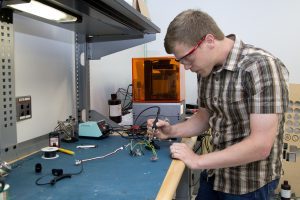 This summer, four Wake County Public School System educators gained insider knowledge into the world of big data, supercomputing and wearable nanotechnology devices through mentorships with experts at IBM and NC State University.
This summer, four Wake County Public School System educators gained insider knowledge into the world of big data, supercomputing and wearable nanotechnology devices through mentorships with experts at IBM and NC State University.
The educators – Megan Peterson (GSK Kenan STEM Fellow) of Fox Road Elementary; David Sander of Wake Forest High; Tamiko Williams of Wake Young Men’s Leadership Academy and Shane Westhafer of Panther Creek High – are taking what they learned this summer from their mentors, Phaedra Boinodiris and Dr. Andy Rindos at IBM, and incorporating it into STEM-connected lessons for their students.
The following are excerpts from a question and answer session on how they plan to leverage the experience.
Q: What did you learn from your IBM mentors, Phaedra or Andy, that you plan to take your classroom?
Shane: The biggest take away from Andy with IBM is how he is able to focus his team on the needs of a
client and guide them toward a solution to the problem while still letting the team make the discovery and
achieve their personal goals.
Tamiko: The school year has begun and I am so excited to implement ideas and projects from my mentor
to my kids at school. As my mentor Phaedra gave me a tour of IBM, I was amazed at the atmosphere of
the “office space.” Many people were working while standing up at an adjustable leveled desk with their
laptops; others were conversing in a reserved room while writing on walls made for dry erase markers (a
teachers dream).
Q: Did you learn about any interesting career paths or on-the-job skills that you will share with your
students? If so, which ones?
Shane: I actually learned about the desired diversity of a person’s skill set on a career path. More of “Okay, you’re here for a computer programming job. What can you offer the team in addition to the job description?”; With the IBM undergrad team, of the seven folks, there were three or four totally different majors represented and even more personal interests.
Megan: During the time I have spent with Phaedra, I have had an opportunity to see what is currently going on in “real world”; jobs so that I can better prepare my students for what is being called “New Collar Jobs”. These are jobs that are often times technology centered and are not in fields where their families have traditional worked. I look forward to being able to take this knowledge back to my students so that they have an understanding of what jobs they can train for to be successful and the types of training they require. I cannot wait to open their eyes to some of the new opportunities that are available to them!
Q: How has this experience helped to reshape you as a teacher leader?
Tamiko: My mentor, Phaedra, and has been a great inspiration to my ideas which has been encouraging and exciting. While she set the goal, my Kenan Fellows cohort gave me ideas to achieve that goal. The successes would be, the collaboration with my cohort, we listen to each other and share ideas on how to improve the quality of our lessons.
David: I cannot possibly describe how deeply honored I am to have been chosen as a Kenan Fellow. I feel inspired to dive deep into this program and make this a truly extraordinary experience. Professional development provided by the Kenan Fellows Program has been the best I have had in my career. I hope others have a chance to experience this in years to come.
Q: Women are often underrepresented in the tech world. How will you use Phaedra’s professional story to inspire young women to aspire to tech careers?
Megan: As my class continues to explore the UN Sustainable Development Goals, I hope to have Phaedra in the school and visible to all students, especially young women. I think she will be an excellent resource for my students as they begin to discuss different topics affecting the world around them and begin to brainstorm ways that they can make a difference through technology.